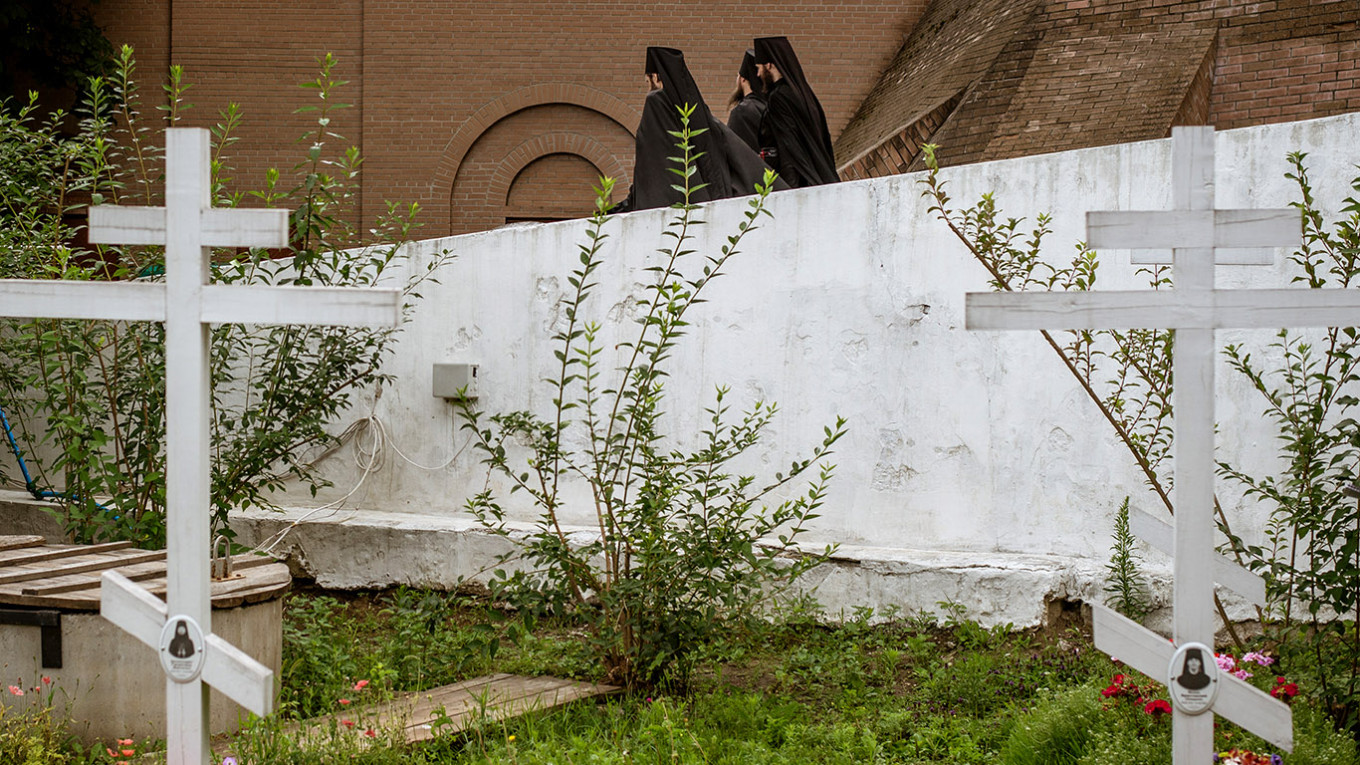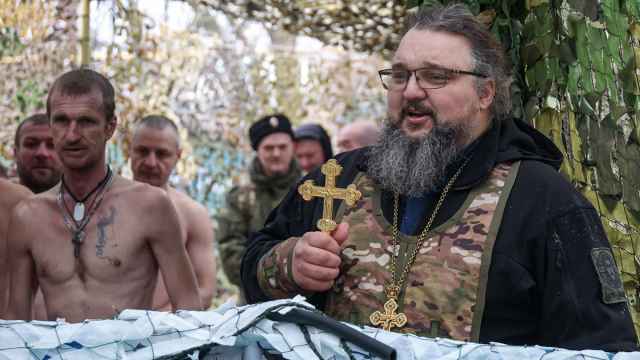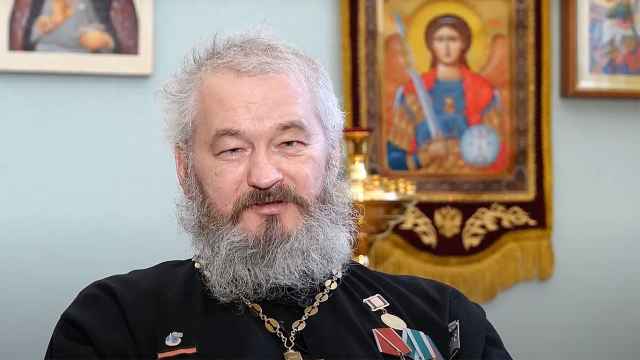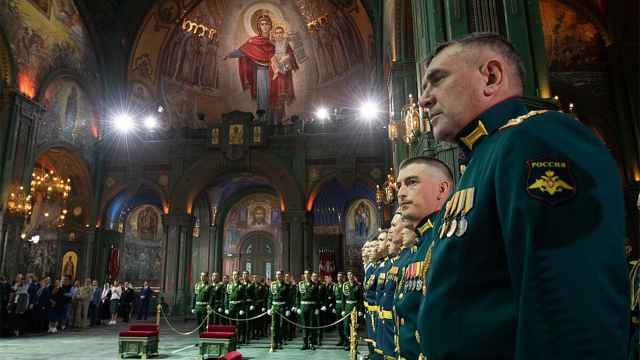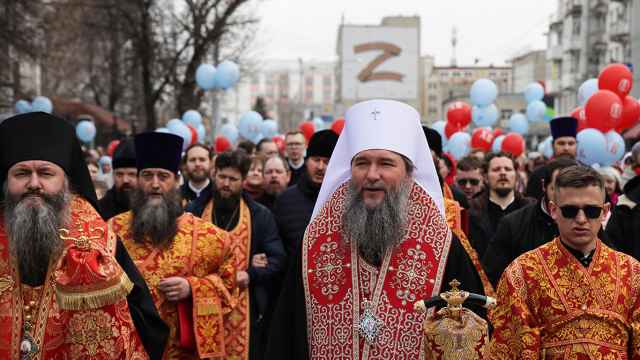This article was updated on Oct. 23, 2024, for factual accuracy and clarity.
Early one morning in July 2023, I boarded a minibus for a weekend pilgrimage to the Pochaiv Monastery in western Ukraine. The country’s second-largest Orthodox complex after the Kyiv Pechersk Lavra, it was founded by monks who fled after the Mongols sacked the capital in 1240. Though it lies on the edge of a mainly Catholic region, Pochaiv is also a stronghold of the Ukrainian Orthodox Church (UOC), historically linked to Moscow.
During the six-hour journey, the woman next to me kept her head down, reciting feverishly from a pocket-sized prayer book. Her eight-year-old daughter and the other passengers whiled away the time watching films, in Russian, about various holy men including St. Iov, the 17th-century abbot of Pochaiv. To view his relics, you slither like a fish through a small hole in the rock to reach an underground cave. Our guide explained that some people who get into the cave cannot get out again until they confess their sins to a priest.
The hilltop monastery, which attracts tens of thousands of visitors each year, belongs to the UOC. But that could soon change. Last month the Verkhovna Rada, Ukraine’s parliament, voted
Signing the bill into law, President Volodymyr Zelensky said Ukrainian orthodoxy was “taking a step toward liberation from the devils of Moscow.” Zelensky was referring to the hawkish hierarchs of the Russian Orthodox Church, especially its head, Patriarch Kirill. The prelate has turned a blind eye to rapes, summary executions and other war crimes in Ukraine because he sees the invasion as part of a larger “metaphysical struggle” against a morally corrupt West. But Kirill has undermined his own position with his unwavering support for the war.
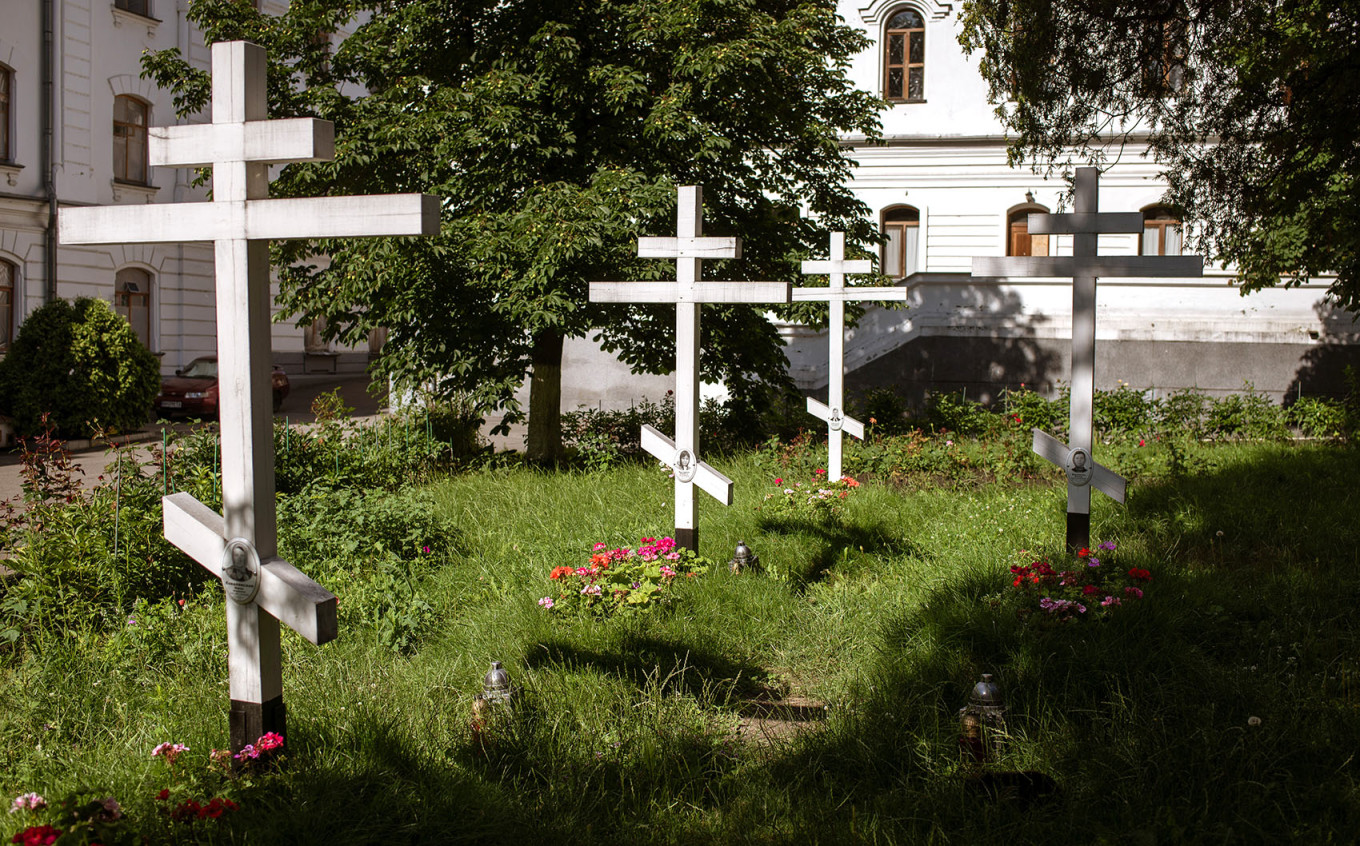
President Vladimir Putin's war, launched two and a half years ago, has had many unintended consequences, from pushing Sweden and Finland into the arms of NATO to deepening Russia’s dependence on China and Iran.
The war is also likely to finish off the UOC, a once influential arm of the Kremlin. The church has removed the letters MP (Moscow Patriarchate) after its name and claims it is “completely independent” from the Russian Orthodox Church. Its head, Metropolitan Onufriy, condemned the “fratricidal war” from the outset. Although its senior clerics have not traveled to Moscow for meetings since February 2022, the UOC still belongs to the Holy Synod, Bishops Council and other commissions and working groups under the authority of the Russian Patriarch, Kirill.
Around 1,500 UOC parishes have already joined a rival ecclesiastical body, the Orthodox Church of Ukraine, although the circumstances of many of these church transfers are contested. The two churches have confusingly similar names and follow the same rituals, but they are poles apart. One is now associated with accusations of spreading Russian propaganda, the other with a sovereign country seeking closer ties with Europe and the West.
For centuries, the UOC was the only recognized branch of Orthodox Christianity in Ukraine. After the collapse of the U.S.S.R., many Ukrainians demanded spiritual autonomy from Moscow. Infighting between rival independent churches delayed the process. But finally, in 2018, two churches in Kyiv merged to form the Orthodox Church of Ukraine. The Patriarch of Constantinople, Bartholomew I, gave it official status the following year.
Although the Orthodox have no Pope, the Constantinople Patriarch, based in Istanbul, is the closest equivalent. He is also known as the Ecumenical Patriarch and — much to Moscow’s annoyance — is seen as primus inter pares — first among equals and senior among all Orthodox bishops.
At a ceremony in Istanbul on Jan. 5, 2019, Bartholomew signed a decree of independence, known as a tomos. Ukraine’s former president, Petro Poroshenko, who had flown to Turkey for the occasion, had long advocated for a self-governing Church. He thanked Bartholomew “for the courage to make this historic decision.”
It was a slap in the face for Putin and Patriarch Kirill. The baptismal font of their revered ancient Rus — the place where the eastern Slavs converted to Christianity in the 10th century — was inconveniently located in another country. The newly independent church undermined Putin’s Russky Mir (Russian world) ideology which insists that a Ukrainian state has never existed independently of Russia.
Kirill, too, was furious. Ukraine has been the Moscow Patriarchate’s second-largest canonical territory since the 17th century. His church stood to lose at least one-fifth of its 150 million members, thousands of parishes and several hundred churches and monasteries.
The story of one priest in the Kyiv region is emblematic. Father Ioann Shevchenko was forced at gunpoint to allow Russian snipers into the bell tower of his church in the village of Bobryk, east of the capital. Their Grad rockets had smashed into his Church of the Ascension, destroying the roof and blowing out the windows. At night, the village suffered almost constant shelling.
When the Russians eventually left, the bodies of six local men were found in a basement, their hands tied behind their backs. Like 12,338 other parishes in Ukraine, Bobryk had belonged to the UOC. After the month-long occupation in the spring of 2022, neither Shevchenko nor his parishioners wanted anything to do with a church that they believe answers to Moscow.
Yet some churchgoers are surprisingly resistant to change. Kateryna, the woman next to me on the minibus to Pochaiv, came from Bucha, where more than 400 civilians were massacred by Russian troops at the beginning of the invasion. The atrocities committed there galvanized many countries into sending weapons to Ukraine.
On the same day that pictures of corpses lying in the streets of the commuter town were beamed around the world, the Patriarch gave a sermon at the Cathedral of the Russian Armed Forces in Moscow, declaring that Russians are “very peace-loving and long-suffering people” who have no “aspirations for war.”
Kateryna and her daughter knew better. They had endured three terrifying weeks cowering in their cellar. But she told me she feared losing divine grace if she left the UOC.
Such is the extraordinary sway of the church across many communities that Ukraine’s security service sees it as a fifth column. To date, around 100 clerics have been arrested and 26 convicted of treacherous acts.
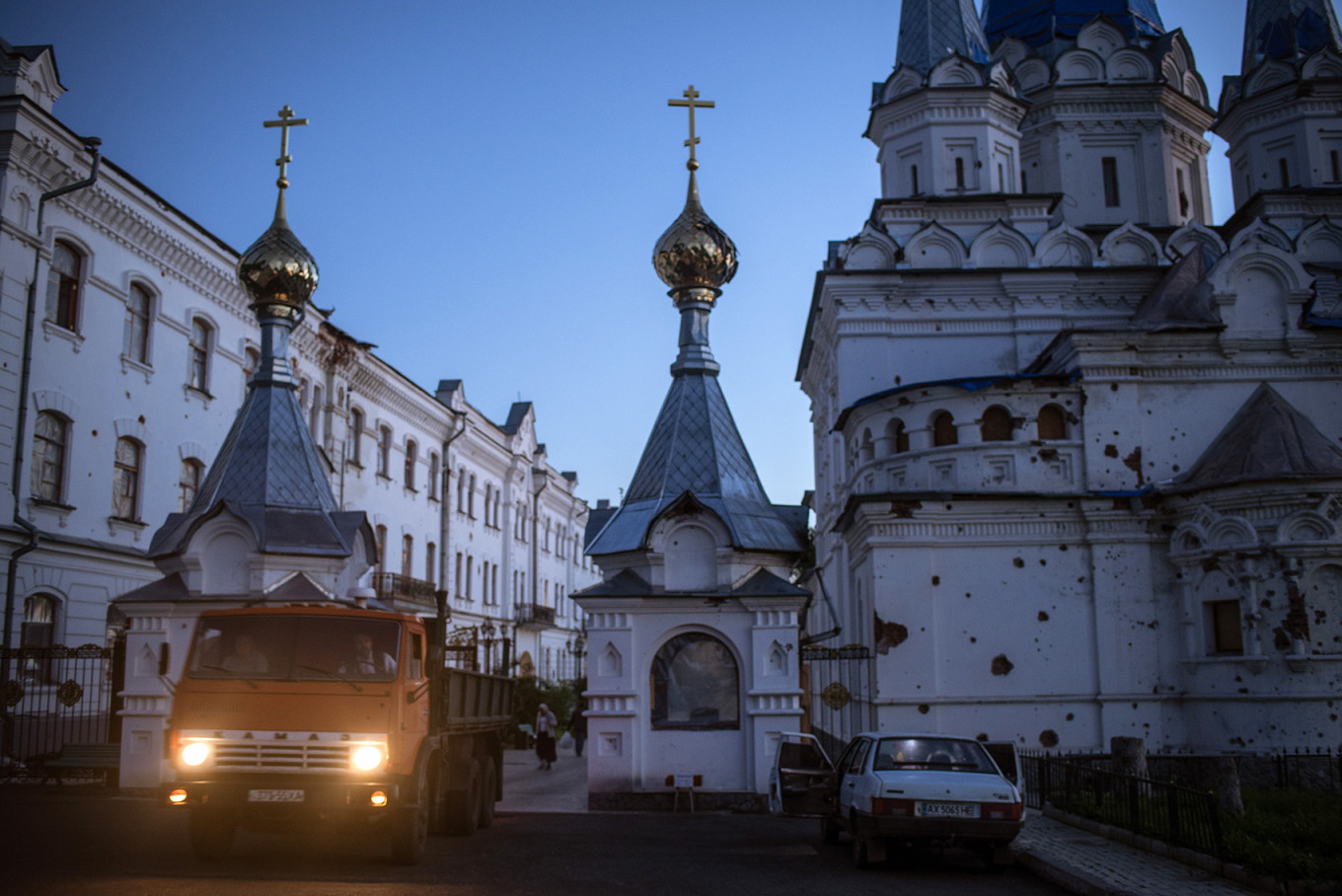
Last summer I traveled to the frontline Sviatohirsk monastery near Slovyansk. Its whitewashed walls were freshly scarred by shelling. I was hoping to meet the abbot, Metropolitan Arseniy, but was told he was indisposed. Perhaps he was feeling vulnerable because Zelensky had issued a decree in December 2022 suspending his Ukrainian citizenship. In April 2024, nine months after my visit, he was arrested for allegedly sharing information with the Russians about Ukrainian army checkpoints in the Kramatorsk district and is facing eight years behind bars.
His lawyers say the charges relate to a sermon (which was filmed and put online) in which the abbot complained that roadblocks had prevented pilgrims from reaching his monastery for a religious feast. They deny he disclosed any precise locations.
I was invited to lunch instead by Archimandrite Feofan, the treasurer of the monastery. He brushed aside a question about influence from Moscow and told me that the monks do not listen to Kirill. Yet he repeated familiar Kremlin rhetoric justifying the invasion. God, he said, had allowed the violence to happen “to repair a nation.”
In all, only two Ukrainian bishops have switched sides — Metropolitan Oleksandr Drabynko in Kyiv and Metropolitan Symeon Shostatskyi from Vinnytsia, west of the capital. I asked Georgiy Kovalenko, the official spokesman for the UOC before he joined the OCU, why so few bishops were on the side of Ukraine’s self-governing church.
His answer: money. Russia’s Church, he said, was like the gas and oil giants Gazprom and Rosneft, “a department of state.” He added, “When we were granted the tomos several clerics told me that they would have liked to join the Orthodox Church of Ukraine. But unfortunately their ‘sponsor’ was against it.”
Kovalenko was talking about businessmen such as Vadim Novinsky, a Russian oligarch granted Ukrainian citizenship in May 2012 by the Kremlin-friendly ex-Ukrainian President Viktor Yanukovych. Yanukovych secured a seat for Novinsky in the Ukrainian parliament as a member of his Party of Regions. Novinsky was so active in championing pro-Russian legislation that fellow parliamentarians called him “Putin’s Whip.”
The oligarch was ordained a protodeacon of the UOC in 2020. He is currently under sanctions and wanted by the Ukrainian authorities for collaboration with the Russian occupier — an accusation he has denied.
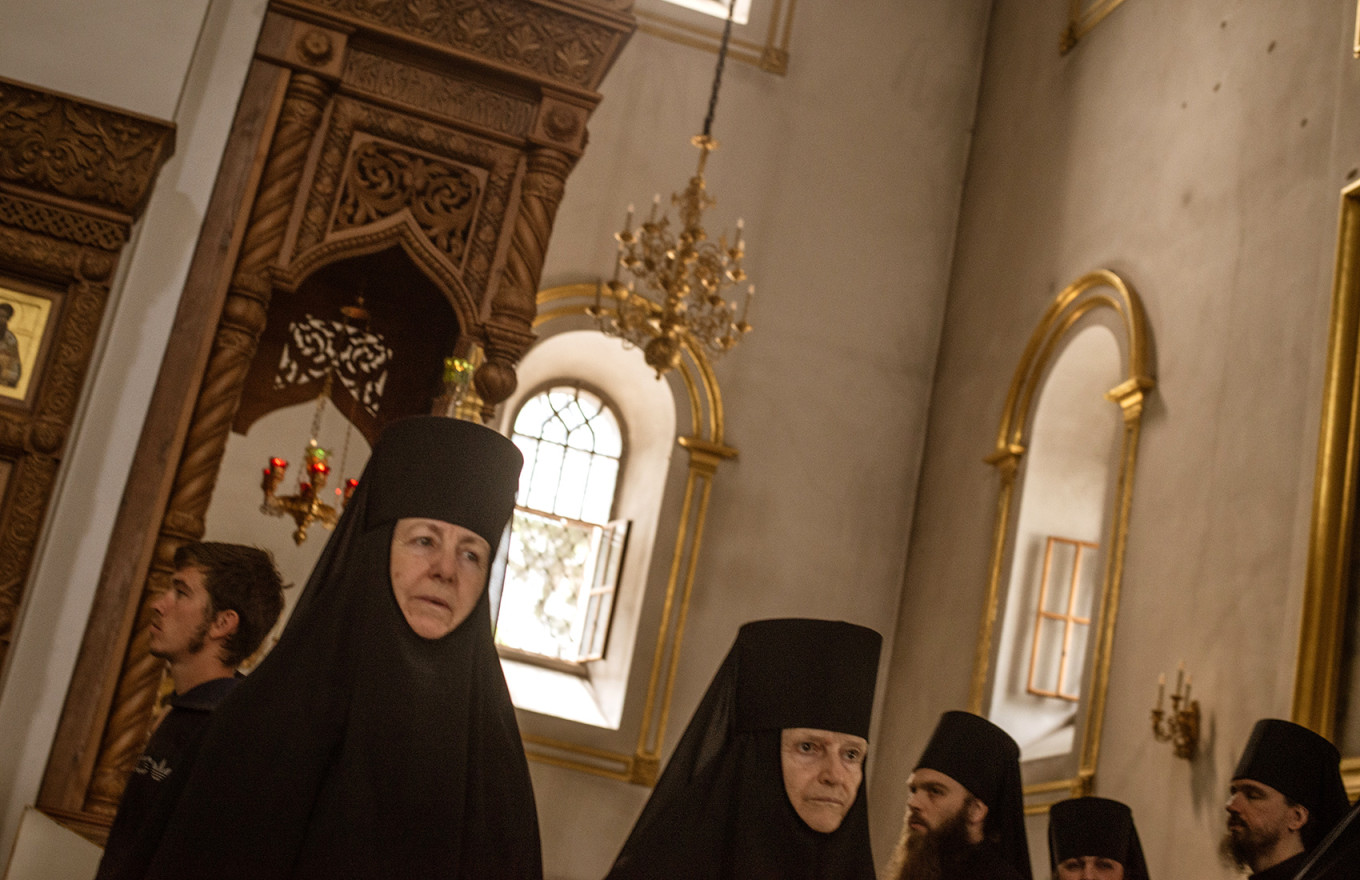
Novinsky argues he is the victim of religious discrimination for his vocal support of the UOC and his efforts to prevent the Church from being banned.
In April 2023, Swiss journalists spotted Novinsky in red and gold vestments officiating at the Easter service at a Russian Orthodox Church in Zurich. He told the reporters he would return to Ukraine “when the time is right.”
Six months later, Maryan Zablotskiy, a Ukrainian MP from President Volodymyr Zelensky’s Servant of the People Party, alleged the UOC had engaged one of America’s highest-paid lobbyists and Novinsky had footed the bill. On his Facebook page, Zablotskiy claimed that the “FSB in cassocks” had been paying Robert Amsterdam to spread false narratives among members of the U.S. Congress that the Ukrainian government was persecuting the UOC.
Amsterdam completely refutes this claim. He is adamant that his work is not being funded in any way by Russia, or any citizen or entity (religious or otherwise) of the Russian Federation. He also asserts that he is “not peddling lies or false narratives,” stating that his work is informed by extensive research, including visits to Ukraine and the advice of leading scholars on Orthodoxy.
Amsterdam also works closely with Ukrainian lawyers acting for the church, including those seeking to release Metropolitan Arseniy. According to Amsterdam, the Ukrainian government’s efforts to ban the UOC amount to a “collective punishment of innocent Ukrainian citizens.”
The PR exercise resonated with some on Capitol Hill. Marjorie Taylor Greene, the far-right representative from Georgia, accused Kyiv of waging “a war against Christianity.” On Steve Bannon’s War Room podcast, she stated as fact that Ukraine’s government was “attacking Christians” and “executing priests.”
“Russia is not doing that,” she added. “They are not attacking Christianity. As a matter of fact, they seem to be protecting it.” This is a grotesque claim given that two years into the full-scale invasion, 39 priests from different churches across Ukraine had died from Russian shelling or were killed execution-style by Russian troops. “Moscow Marjorie” may be widely discredited, even in her own party, but archconservatives in the U.S. have used the row as an excuse to cut military aid.
The new law gives the UOC nine months to definitively cut ties with Moscow or risk being shut down by court order. Some clerics fear there could be ugly scenes over church property next summer and are urging restraint. A brawl filmed at a monastery south of Kyiv, in which OCU parishioners attacked their counterparts in the UOC worried Archimandrite Cyril Hovorun, a prominent theologian.
“Ukraine loses both tactically and strategically from such episodes,” he warned. “These videos will mobilize American isolationists who will campaign to reduce support for our country.” A manifesto recently signed by 300 priests and more than 1,000 parishioners echoed his concerns: "Clashes and conflicts over church buildings disgrace Orthodox Christianity. Faith is not measured by the number of square meters in a cathedral or a monastery. For our unchristian behavior, the Lord will empty our churches, 'taken away from the enemies'."
Ukrainians take pride in being more devout than their eastern neighbors. Viktor Yelenskiy, head of the National Service for Ethnic Policy and Freedom of Conscience gave a scathing [corrects typo in original] assessment of Russia. “So-called ‘Holy Russia’ has among the highest rates for crime, alcoholism, abandoned children and suicide. but when it comes to attending religious services, it is near the bottom, roughly on par with the Netherlands,” he told me. The “wave of fury in society” means the UOC has an uncertain future in Ukraine, he says.
Lucy Ash’s book – The Baton and the Cross: Russia's Church from Pagans to Putin – is out now.
A Message from The Moscow Times:
Dear readers,
We are facing unprecedented challenges. Russia's Prosecutor General's Office has designated The Moscow Times as an "undesirable" organization, criminalizing our work and putting our staff at risk of prosecution. This follows our earlier unjust labeling as a "foreign agent."
These actions are direct attempts to silence independent journalism in Russia. The authorities claim our work "discredits the decisions of the Russian leadership." We see things differently: we strive to provide accurate, unbiased reporting on Russia.
We, the journalists of The Moscow Times, refuse to be silenced. But to continue our work, we need your help.
Your support, no matter how small, makes a world of difference. If you can, please support us monthly starting from just $2. It's quick to set up, and every contribution makes a significant impact.
By supporting The Moscow Times, you're defending open, independent journalism in the face of repression. Thank you for standing with us.
Remind me later.



